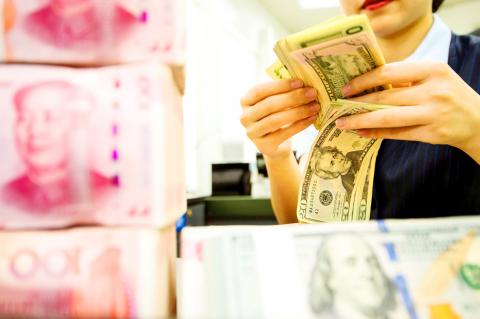US President Donald Trump’s administration on Monday formally labeled China a currency manipulator, further escalating its trade war with Beijing after the People’s Bank of China (PBOC) allowed the yuan to fall in retaliation for new US tariffs.
While the US Department of the Treasury’s determination is largely symbolic, as the potential punishments are a shadow of the steps Trump has already taken against China, it underscores the rapidly deteriorating relationship between the world’s two largest economies.
The US announcement followed a declaration by PBOC Governor Yi Gang (易綱) that China would not use the yuan as a tool to deal with trade disputes.

Photo: AFP
“I am fully confident that the yuan will remain a strong currency in spite of recent fluctuations amid external uncertainties,” Yi said in a statement.
Under the designation, US Secretary of the Treasury Steven Mnuchin “will engage with the International Monetary Fund to eliminate the unfair competitive advantage created by China’s latest actions,” the department said in a statement.
Trump called the yuan’s plunge below the symbolically important level of 7 per US dollar “currency manipulation” in a tweet.
It is the first time that the US labeled a country a manipulator since the 1990s, when China was also the target.
The PBOC called the designation “wayward unilateralism and protectionist,” and said it “seriously undermined international rules.”
The yuan exchange rate “is driven and determined by market forces,” it said in a statement.
Both the onshore and offshore yuan breached the 7.0 level against the US dollar on Monday, which investors see as a key threshold in the Chinese currency’s value, but foreign exchange trading yesterday was calmer, with the onshore yuan weakening 0.08 percent to 7.0512, and the offshore currency strengthening 0.24 percent to 7.0802.
The PBOC yesterday weakened its central parity bank rate to the lowest level in more than 11 years, but by less than many analysts were expecting — suggesting the bank does not want to let the currency move too much.
“A more market-friendly China fix provided the first signal that the PBOC is having a second thought about weaponizing the yuan,” said Stephen Innes, managing partner at VM Markets Pte Ltd Singapore.
“However, the fix is ambiguous enough to keep two-sided interest alive while still conveying a message to US trade hawks that in no uncertain terms will China be a pushover,” he said.
The PBOC yesterday announced that it would sell 30 billion yuan (US$4.2 billion) of bills in Hong Kong on Wednesday next week. The move typically drains liquidity offshore, making it more costly to short the Chinese currency.
The move helped drive the yuan up 0.2 percent.
If there is no progress a year after the designation, China could face possible sanctions, including its firms being prohibited from competition for US government contracts and excluded from getting financing from a US government agency for development projects.

CHIP WAR: The new restrictions are expected to cut off China’s access to Taiwan’s technologies, materials and equipment essential to building AI semiconductors Taiwan has blacklisted Huawei Technologies Co (華為) and Semiconductor Manufacturing International Corp (SMIC, 中芯), dealing another major blow to the two companies spearheading China’s efforts to develop cutting-edge artificial intelligence (AI) chip technologies. The Ministry of Economic Affairs’ International Trade Administration has included Huawei, SMIC and several of their subsidiaries in an update of its so-called strategic high-tech commodities entity list, the latest version on its Web site showed on Saturday. It did not publicly announce the change. Other entities on the list include organizations such as the Taliban and al-Qaeda, as well as companies in China, Iran and elsewhere. Local companies need

CRITICISM: It is generally accepted that the Straits Forum is a CCP ‘united front’ platform, and anyone attending should maintain Taiwan’s dignity, the council said The Mainland Affairs Council (MAC) yesterday said it deeply regrets that former president Ma Ying-jeou (馬英九) echoed the Chinese Communist Party’s (CCP) “one China” principle and “united front” tactics by telling the Straits Forum that Taiwanese yearn for both sides of the Taiwan Strait to move toward “peace” and “integration.” The 17th annual Straits Forum yesterday opened in Xiamen, China, and while the Chinese Nationalist Party’s (KMT) local government heads were absent for the first time in 17 years, Ma attended the forum as “former KMT chairperson” and met with Chinese People’s Political Consultative Conference Chairman Wang Huning (王滬寧). Wang

CROSS-STRAIT: The MAC said it barred the Chinese officials from attending an event, because they failed to provide guarantees that Taiwan would be treated with respect The Mainland Affairs Council (MAC) on Friday night defended its decision to bar Chinese officials and tourism representatives from attending a tourism event in Taipei next month, citing the unsafe conditions for Taiwanese in China. The Taipei International Summer Travel Expo, organized by the Taiwan Tourism Exchange Association, is to run from July 18 to 21. China’s Taiwan Affairs Office spokeswoman Zhu Fenglian (朱鳳蓮) on Friday said that representatives from China’s travel industry were excluded from the expo. The Democratic Progressive Party government is obstructing cross-strait tourism exchange in a vain attempt to ignore the mainstream support for peaceful development

ELITE UNIT: President William Lai yesterday praised the National Police Agency’s Special Operations Group after watching it go through assault training and hostage rescue drills The US Navy regularly conducts global war games to develop deterrence strategies against a potential Chinese invasion of Taiwan, aimed at making the nation “a very difficult target to take,” US Acting Chief of Naval Operations James Kilby said on Wednesday. Testifying before the US House of Representatives Armed Services Committee, Kilby said the navy has studied the issue extensively, including routine simulations at the Naval War College. The navy is focused on five key areas: long-range strike capabilities; countering China’s command, control, communications, computers, cyber, intelligence, surveillance, reconnaissance and targeting; terminal ship defense; contested logistics; and nontraditional maritime denial tactics, Kilby